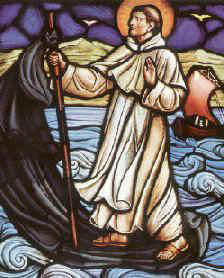|
To work for the proper implementation of canon law is to play an extraordinarily constructive role in continuing the redemptive mission of Christ. Pope John Paul II |
|
|
|
|
Resolution 1152 x 864 |
Updated 5 jan 2013 |
Excommunication:
Wave of the Future? |
|
Edward Peters, "Excommunication: wave of the future?", National Catholic Register (7 Jul 1996) 6.
|
After "inquisition", no word in Catholic life conjures up specters of hierarchic persecution more quickly than "excommunication." But unlike the Inquisition, excommunication is a living part of Church law and, judging from recent events in the United States and Mexico, one that is likely to become more common.
The notion that excommunication, the Church's most severe censure, is a "living part' of ecclesiastical law strikes some as ironic. And yet, by classifying excommunication as a "censure" with medicinal purposes instead of as an "expiatory penalty" oriented to justice (see Canon 1312), canon law makes clear that its gravest penalty is designed primarily to bring about a personal reform. A bishop who actually considers invoking the penalty of excommunication, however, faces several difficulties.
First, the 1983 Code of Canon law, which rightly favors pastoral resolutions of contentious situations over penal responses, has, some argue, been drafted in favor of the accused so as to make excommunication very difficult to apply in actual cases. To take just one example, while the number of ecclesiastical crimes punished by excommunication was sharply reduced in the revised Code, diocesan bishops who might wish to extend the reach of excommunication to meet new problems are expressly discouraged from enacting local laws involving that penalty (see Canons 1317-1318).
Second, on a more mundane level, being a bishop or even a canon lawyer does not guarantee sufficient knowledge to correctly apply those provisions governing excommunication which do exist. Of the roughly 2,000 canon lawyers in the United States, probably fewer than 20 possess the level of understanding of ecclesiastical criminal law needed to effectively prosecute and defend excommunication cases. The very rarity of penal cases means that, a dozen years after the revised law went into effect, the canons on excommunication remain relatively untested. Few ecclesiastical administrators relish venturing into unfamiliar, and clearly controversial, areas.
But beyond such practical problems, bishops face a greater obstacle in excommunication cases. Because the Church has no physical means of enforcing its sanctions and virtually no financial leverage over the community it governs, its system of censures, especially excommunication, depends for its effectiveness on the faithful's grasp of and commitment to Church teaching. But a crisis of self-understanding has impacted much of the Western Church in the last 30 years. Therefore, until the values of being in communion with the Church are again understood at the popular level, the consequences of being out of communion with the Church will remain unappreciated.
Naturally, each of these disparate issues must be carefully weighed by bishops, well in advance of beginning an excommunication process. Once an announcement about excommunication is made, bishops and their staffs will probably find themselves at the center of a veritable feeding frenzy in the secular media. That would be a poor time to discover gaps in the preparation of an excommunication case, for such slips would allow the focus of attention to shift from the activities alleged to be destructive of ecclesial well-being to the technicalities of the process by which those activities are measured.
Against these many difficulties, however, bishops must weigh their basic duties to defend the teachings of the Church and to promote the spiritual welfare of the individuals committed to their care. Put another way, just as bishops are bound by Canon 1341 to employ all the pastoral means available for resolving penal situations before resorting to formal sanctions, so bishops are bound by Canon 392 "to promote the common discipline of the whole Church and to urge the observance of all ecclesiastical laws."
The problems outlined above are not necessarily barriers to action. For example, while the procedural difficulties of adjudicating excommunication cases are real, they also tend to be exaggerated in the minds of some administrators. And while a bishop cannot be excused from following canonical due process merely because "he is trying to do the right thing," canon law can and should be amended where practical experience shows its deficiency as written.
As for the shortage of qualified advisors in this area, including those whose advice might be against using excommunication in certain cases, bishops simply should consult with them before acting. Certainly, those individuals threatened with excommunication will exercise their right to seek the best in canonical advice; bishops should be no less prudent.
Finally, the post-conciliar period of ecclesiastical self-questioning--which might have provided both religious leadership and the common faithful with a basis for avoiding considering excommunication as a means to defend the Church's identity or for recalling wayward individuals from their errors--is on the wane. As the Catechism of the Catholic Church and other recent efforts become more effective in rearticulating authentic Catholic beliefs, the antipathy between solid Church teaching and the hardening of positions by certain extremists operating, or claiming to operate, under the color of Church authority will be drawn in ever sharper contrast. This combination of factors will almost certainly result in more cases in which excommunication will be proposed, considered, and in due course applied.
|




